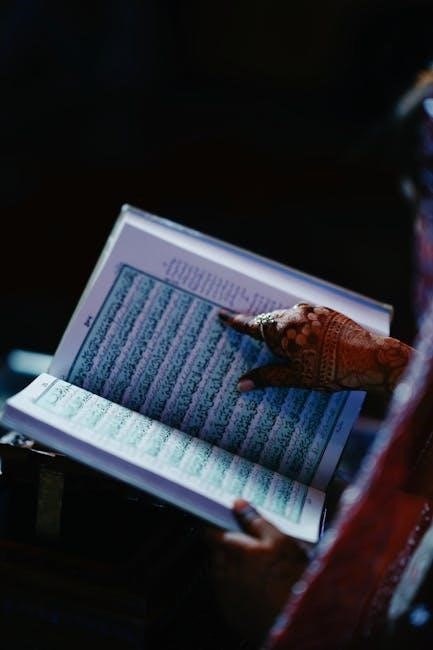Dream interpretation holds a revered place in Islamic tradition, offering spiritual insight and divine guidance. Rooted in the teachings of Prophet Muhammad (Peace Be Upon Him) and early scholars like Ibn Sirin, this practice emphasizes understanding dreams as potential divine messages, blending faith and wisdom to unravel their deeper meanings and significance in a believer’s life.
Importance of Dreams in Islamic Culture
Dreams hold significant importance in Islamic culture, viewed as a means of divine communication and guidance. Prophet Muhammad (Peace Be Upon Him) and scholars like Ibn Sirin emphasized their spiritual value. True dreams, considered revelations from Allah, provide comfort and insight, reflecting Islamic principles. This belief fosters a deep respect for dreams, influencing personal decisions and communal practices, embedding them into the fabric of Islamic life and shaping both individual and collective faith experiences.
Historical Background of Dream Interpretation
Dream interpretation in Islam traces its roots to the Prophet Muhammad (Peace Be Upon Him), who valued dreams as divine messages. Early Islamic scholars, such as Ibn Sirin, systematized this knowledge, creating foundational texts like his Dictionary of Dreams. These works drew from Quranic teachings, Hadith, and spiritual insights, establishing dream interpretation as a respected science. Over centuries, Islamic dream interpretation evolved, blending scriptural wisdom with cultural practices, becoming a vital tool for personal guidance and communal understanding, reflecting the enduring importance of spiritual discernment in Islamic tradition.

The Role of Dreams in Islamic Theology
Dreams in Islamic theology serve as a divine communication tool, offering spiritual insight and personal guidance. They are considered a form of revelation and inspiration, reflecting Islamic beliefs about God’s interaction with humanity.
Types of Dreams in Islam: True and False
In Islam, dreams are classified into two categories: true (al-ruya) and false (al-hulum). True dreams are considered divine guidance from Allah, often symbolizing future events or hidden truths, while false dreams arise from worldly desires or Satan’s influence. True dreams are characterized by clarity and peace, whereas false ones may cause disturbance. The Prophet Muhammad (Peace Be Upon Him) emphasized the importance of interpreting true dreams, as they can provide insight and wisdom. Understanding this distinction is crucial for believers, as it helps them discern divine messages from mere fantasies, aligning their actions with Islamic teachings and values.
Dreams as a Form of Divine Communication
Dreams serve as a vital medium of divine communication in Islam, offering believers guidance and insight into spiritual truths. The Prophet Muhammad (Peace Be Upon Him) and early Islamic scholars like Ibn Sirin emphasized that true dreams are a form of revelation from Allah. These dreams often carry symbolic or metaphorical meanings that require interpretation to uncover their deeper significance. By understanding and reflecting on such dreams, Muslims can strengthen their faith, gain wisdom, and align their lives with divine will. This unique form of communication underscores the profound connection between the spiritual and the mundane, enriching the believer’s journey towards closeness with Allah.

Ibn Sirin and His Contributions to Dream Interpretation
Ibn Sirin compiled symbolic meanings of dreams, blending cultural and spiritual insights. His work remains a foundational resource for understanding divine messages through dreams in Islam.
Biography of Ibn Sirin
Ibn Sirin, a renowned Islamic scholar, was born in 33 AH and grew up in Basra, Iraq. He was a companion of the Companions of the Prophet Muhammad (Peace Be Upon Him) and excelled in various fields, including Qur’anic exegesis, jurisprudence, and dream interpretation. Known for his piety and wisdom, Ibn Sirin’s insights into dreams were deeply rooted in Islamic theology and cultural traditions. His work laid the foundation for understanding dreams as a form of divine communication, blending symbolic meanings with spiritual guidance. His legacy endures through his influential book on dream interpretation, a timeless resource for Muslims seeking deeper understanding.
Structure and Content of Ibn Sirin’s Dictionary of Dreams
Ibn Sirin’s Dictionary of Dreams is a comprehensive guide structured to explore symbolic meanings within Islamic traditions. The text categorizes dream elements, linking them to Qur’anic verses and Hadiths. It begins with a theological framework, establishing dreams as divine messages. The core sections delve into specific symbols, such as natural elements, animals, and human actions, providing interpretations that reflect spiritual and cultural values. The dictionary also includes practical advice for dreamers and interpreters, emphasizing ethical considerations. Its meticulous organization and depth make it a seminal work, bridging spirituality with practical wisdom, and remains a vital resource for understanding dreams in Islam.
Cultural and Spiritual Significance of His Work
Ibn Sirin’s contributions to dream interpretation have profound cultural and spiritual significance in Islam. His work bridges theology and mysticism, offering believers a tool to connect with divine messages. By framing dreams within Islamic values, his teachings have guided generations in understanding life’s challenges and opportunities. Culturally, his interpretations are woven into daily life, influencing decision-making and spiritual growth. Spiritually, they reinforce the belief in divine communication, fostering a deeper connection to faith and providing solace in times of uncertainty. His work remains a cornerstone of Islamic thought, preserving traditions while inspiring contemporary seekers of spiritual wisdom and guidance.
Etiquette of Dream Interpretation in Islam
Dream interpretation in Islam requires piety, discretion, and seeking guidance from knowledgeable scholars. Sharing dreams wisely and maintaining confidentiality are emphasized to preserve dignity and spiritual integrity.
Guidelines for the Dreamer
In Islam, dreamers are advised to approach their experiences with piety and discernment. They should seek interpretations from righteous, knowledgeable scholars who maintain Taqwa. Sharing dreams selectively is emphasized, avoiding disclosure of inappropriate or confusing content. Dreamers are encouraged to reflect on their own faith and actions, as true dreams often reflect spiritual truths. The Prophet Muhammad (Peace Be Upon Him) taught that true dreams are a form of divine inspiration, guiding believers toward righteousness. Therefore, dreamers should remain humble, trust in Allah’s wisdom, and seek guidance from those qualified to provide meaningful interpretations, ensuring their spiritual well-being and clarity in understanding divine messages.
Responsibilities of the Interpreter

The interpreter of dreams in Islam holds a sacred responsibility, requiring deep religious knowledge, piety, and wisdom. They must ensure interpretations align with the Quran, Hadith, and Islamic principles, avoiding baseless speculation. Confidentiality is crucial; shared dreams should not be disclosed without consent. Interpreters must approach each dream with empathy, considering the dreamer’s context and offering guidance that fosters spiritual growth. They should avoid causing unnecessary fear or confusion, focusing instead on providing clarity and constructive advice. Ultimately, interpreters act as trusted guides, helping believers understand divine messages and apply them to their lives in a way that strengthens faith and promotes righteousness. Their role is both a privilege and a solemn duty.

Case Studies of Dream Interpretation in Islamic History
Case studies of Islamic dream interpretation highlight Prophet Muhammad’s insightful interpretations and his companions’ experiences, offering guidance and validation of Islamic beliefs through divine inspiration and real-world fulfillment.
Dreams Interpreted by the Prophet Muhammad (Peace Be Upon Him)
The Prophet Muhammad (Peace Be Upon Him) was renowned for his profound interpretations of dreams, which often carried divine messages. One notable example is his interpretation of a dream where he saw the Kaaba, which foretold significant events. Another instance was his night journey, a divine revelation through a dream, showcasing his special connection to Allah. His interpretations emphasized the distinction between true and false dreams, with true ones being a form of divine guidance. These interpretations not only provided spiritual insight but also reinforced Islamic beliefs and practices, making them a cornerstone of Islamic tradition and a source of inspiration for believers. His ability to interpret dreams with accuracy and wisdom further solidified his role as a guide for the Muslim community, highlighting the importance of dreams in Islamic spirituality and their role in shaping faith and understanding. By sharing these interpretations, the Prophet demonstrated how dreams could serve as a means of divine communication, offering lessons and reassurance to his followers. His legacy in dream interpretation remains a vital part of Islamic heritage, providing a framework for understanding and applying these divine messages in daily life.
Examples from the Companions of the Prophet
The Companions of the Prophet Muhammad (Peace Be Upon Him) also experienced significant dreams that were interpreted within the Islamic framework. For instance, Abu Bakr (may Allah be pleased with him) had a dream about the Prophet’s migration to Medina, which later came to pass. Similarly, Umar (may Allah be pleased with him) had a dream regarding the siege of Constantinople, which the Prophet interpreted as a future victory. These examples highlight the role of dreams in guiding the early Muslim community and reinforcing their faith. The interpretations, often provided by the Prophet, served as a source of comfort, guidance, and reassurance for the believers, further emphasizing the spiritual significance of dreams in Islam. These accounts remain vital in Islamic tradition, illustrating how divine communication continued to inspire and direct the Muslim community. The companions’ experiences with dreams underscore the importance of seeking meaning and divine wisdom in such visions, as taught by the Prophet.
Modern Perspectives on Islamic Dream Interpretation
Modern scholars integrate Islamic dream interpretation with psychological insights, emphasizing personal reflection and faith. This blend offers a holistic understanding of dreams, aligning tradition with contemporary spirituality.
Psychological and Spiritual Insights
Modern Islamic dream interpretation combines psychological understanding with spiritual reflection, emphasizing the connection between the subconscious and divine wisdom. This approach encourages believers to explore personal emotions and faith, fostering deeper self-awareness. By integrating psychological theories with Islamic teachings, scholars provide a balanced view of dreams as both inner reflections and potential divine messages. This holistic perspective helps individuals navigate life challenges and strengthen their relationship with Allah, aligning mental well-being with spiritual growth. Such insights highlight the enduring relevance of Islamic dream interpretation in addressing contemporary emotional and spiritual needs.
Contemporary Resources and Literature
Modern Islamic dream interpretation benefits from a wealth of resources, including PDF guides and scholarly works. Classic texts like Ibn Sirin’s Dictionary of Dreams remain foundational, offering timeless insights. Contemporary authors have also produced accessible literature, blending traditional Islamic wisdom with modern psychological perspectives. Online platforms and apps now provide instant access to dream interpretations, making this knowledge more accessible than ever. These resources cater to both spiritual seekers and academic researchers, ensuring the tradition remains vibrant and relevant in the digital age. They bridge ancient teachings with contemporary understanding, fostering a deeper appreciation for the role of dreams in Islamic spirituality and daily life.
